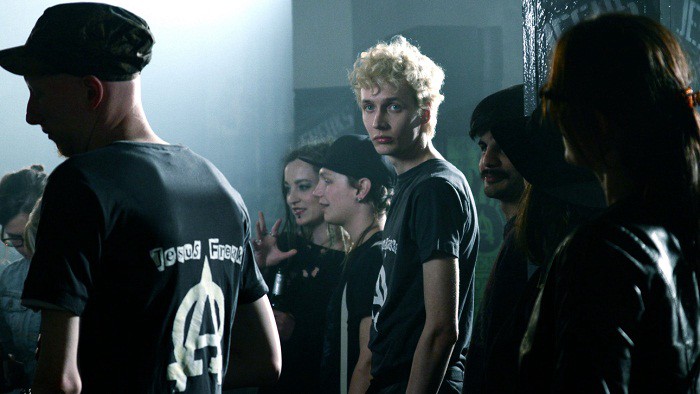Katrin Gebbe attended the Utrecht Graduate School of Visual Arts and Design in the Netherlands and received her master’s degree in directing at the Hamburg
Media School. Her short, Sores & Sirin, won the European Union’s Young CIVIS Media Prize. Nothing Bad Can Happen is her first feature
film. (AFI)
Nothing Bad Can Happen
will be playing AFI as part of the New Auteurs program.
Women and Hollywood: Please give us your description of the film playing at AFI.
Katrin Gebbe: In Nothing Bad Can Happen, Tore (25yrs) belongs to the Jesus Freaks, a Christian punk movement rebelling against established
religion whilst at the same time following Jesus’ precepts of love. One day, in what appears to be a miracle, Tore manages to repair a car with a prayer
and gets to know the driver, Benno. Before long, Tore is invited to move into a tent in Benno’s garden and gradually becomes part of his family. But Benno
can’t resist playing cruel game, designed to test Tore’s faith. As the violence becomes more and more extreme, Tore’s capacity for love is pushed to its
limits — but also Benno is tested.
WaH: What drew you to this story?
KG: Nothing Bad Can Happen is inspired by true events that occurred in Germany some years ago. The press judged the people involved in a very easy
way. But I felt this story about victims, offenders, scape-goatism, sacrifice, faith and love could be lifted up to something bigger. At that time I was
reading The Idiot by Dostoyevsky which was a huge inspiration and I felt this dark story needed a counterweight: A beautiful, handsome, good,
believing person. A modern Jesus Christ — or just an ordinary “idiot?”
WaH: What was the biggest challenge?
KG: In my opinion the biggest challenge was to trust my intuition and go all the way with the story. To not give easy answers and move away from typical
social drama and tell a story about good and bad. To tell what was needed and not what I expected people would love to see. I was thinking about what I
wanted, and I wanted to create a poetic movie which shocks and pleases you with beautiful moments all at the same time. A fight between repulsion and
attraction.
WaH: What advice do you have for other female directors?
KG: Find partners you really respect and feel comfortable working with. Trust your intuitions and never give up. Don’t be afraid, use your humor and enjoy
doing what you love.
WaH: What are the biggest challenges and or opportunities for the future with the changing distribution mechanisms for films?
KG: I think it’s amazing to give people the opportunity to watch recent work anywhere on earth at the same time whenever they like. But I also hope the
viewers keep appreciating the intellectual work of the filmmakers and not just become mass-consumers. The competition is strong which is good for the
development of new ideas; however I think it is important for filmmakers to also stick with their own voice and interests. It’s not smart to just feed the
market, the art of filmmaking should be enjoyed in all its varieties.
WaH: Name your favorite women directed film and why.
KG: I don’t have this one favorite movie. I like movies because of their very own visions and strengths. Recent films by women filmmakers I appreciate a
lot are Winter’s Bone by Debra Granik, Sleeping Beauty by Julia Leigh and Fish Tank by Andrea Arnold. What they all have in
common is that they explore darker facets of social life, but add a certain poetry and add a very personal atmosphere.







